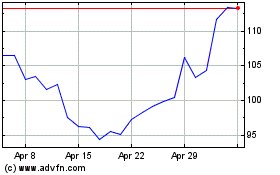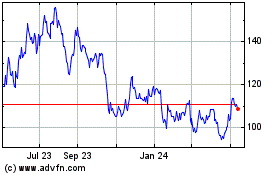Jim Breyer, IDG Raise $1 Billion China Fund
July 12 2016 - 11:40AM
Dow Jones News
Veteran Silicon Valley investor Jim Breyer and Chinese firm IDG
Capital Partners have raised one of the largest venture-capital
funds in China despite concerns that the market for later-stage
startups is overheated.
Mr. Breyer, best known for his early investment in Facebook
Inc., and IDG Capital, one of China's top investors, jointly
announced Tuesday they raised $1 billion to invest in growth-stage
companies both in China and those looking to enter the country. The
new fund will make investments in a wide range of industries
including technology, media, health care and energy.
The fund is the seventh and largest China investment fund that
IDG and Mr. Breyer have sponsored dating back to 2005, according to
Dow Jones LP Source. The first five were a collaboration between
IDG and Mr. Breyer's old U.S. firm, Accel Partners, and the last
two between IDG and Mr. Breyer's new firm, Breyer Capital.
At $1 billion under management, IDG Capital Fund III nearly
doubles the prior fund's $586 million. That fund, raised in 2014,
was smaller in part because it focused on early-stage startups
while the new one is targeting more mature companies. The last
growth fund, raised by IDG and Accel Partners, was $750 million in
2011.
One challenge, said Mr. Breyer in an interview, will be finding
investments in today's "frothy" market. "When late-stage company
valuations are as high as they are today in China and the U.S.,
prospective returns are much lower than they have been," he said.
"I try to remind myself and my Chinese partners: 'Do not pursue
high returns in a low-return environment.' "
Of the 10 largest global venture-capital funding rounds this
year, six of them involved Chinese companies, according to Dow
Jones VentureSource. They include a $4.5 billion investment in Didi
Chuxing Technology Co. that valued the ride-hailing company at $28
billion, and a $3.3 billion deal for Meituan-Dianping that gave the
e-commerce company a valuation over $18 billion.
Mr. Breyer said that considering the high valuations for private
companies, the firm will deploy its capital slowly over three to
four years for new investments. "One of the hardest parts of the
business to continuously try to master is to come to work and in
some cases not make new investments for a year," Mr. Breyer
said.
There are other challenges to investing in China. The country
restricts foreign investments in certain classes of companies that
hope to go public, including internet companies. That may have been
a bigger problem a year ago, when the Chinese stock market was
rising to new highs. At that point, even some companies trading
publicly in the U.S. went private so they could relist in
China.
But the Shanghai Composite Index crashed last summer. It is down
more than 40% from its 2015 high, reducing excitement locally for
highflying tech companies. The volatility was also blamed by many
venture capitalists for piercing the bubble that had started to
inflate valuations of late-stage U.S. private companies.
The decline in valuations has at least taken some air out of the
market, which could bolster future returns. And Mr. Breyer
nonetheless remains excited about Chinese investment opportunities.
"We believe there are some emerging opportunities around enterprise
in China and cloud computing that many global investors outside of
China [are] underestimating," he said.
The Breyer-Accel-IDG partnership over the years has resulted in
some big winners. One is Legendary Entertainment, which Accel,
Breyer Capital and IDG-Accel invested in six years ago and which
sold itself for $3.5 billion earlier this year to Chinese
conglomerate Dalian Wanda Group Co.
IDG Capital is also an investor in several companies valued at
$1 billion or more, including Chinese mobile-phone maker Xiaomi
Ltd., last valued at $46 billion, and Chinese e-commerce site Vancl
at $3 billion. Its big past bets include Baidu Inc., Tencent
Holdings Ltd., and Qihoo 360 Technology Co.
Write to Rolfe Winkler at rolfe.winkler@wsj.com
(END) Dow Jones Newswires
July 12, 2016 11:25 ET (15:25 GMT)
Copyright (c) 2016 Dow Jones & Company, Inc.
Baidu (NASDAQ:BIDU)
Historical Stock Chart
From Mar 2024 to Apr 2024

Baidu (NASDAQ:BIDU)
Historical Stock Chart
From Apr 2023 to Apr 2024
